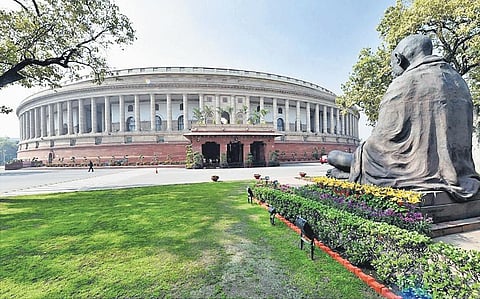

The no-confidence motion by the Opposition in Parliament on Manipur last week had just one intent: to haul Prime Minister Narendra Modi to the House so he could be held responsible for the painful situation in that state. The Opposition succeeded. But did it help them? Doubtful. The ruling party and its absolute leader showed how invulnerable they are in numbers and how solid Modi’s position is in the BJP. No politician in recent Indian politics exults in power as much as the prime minister. Indira Gandhi comes close, but that was in another country; besides, she is dead.
Modi’s contempt for Rahul Gandhi and the Opposition was never more in evidence. He cracked his jokes like a whip. Into the welts he opened, he rubbed the salt of his sarcasm. When the victims howled in pain, he bared a smile, like a knife unsheathed.
His speech was the last. Others from his party had already extolled his achievements during the previous nine consecutive years as prime minister. Then, in his way, he proceeded to evaluate himself and was found, unsurprisingly, not wanting.
His a priori position is that everything he does is for his country. Naturally, those who question do not have India’s interests at heart. As a result, he is always right even before he begins to speak. Modi is India.
A few days ago, Parliament passed the Delhi Services Bill. The Bill takes substantial administrative powers from the elected government and hands it to the Lieutenant Governor, who answers to the home ministry. For all practical purposes, the spectacular AAP electoral victories right under the BJP’s nose have become insubstantial overnight. And each time this sort of thing happens, the Opposition finds that its resistance defines its feebleness. The frustrations of the Opposition only serve to underline the new paradoxical paradigm: the one-party democracy.
A day after the no-confidence motion, the home minister, Amit Shah, introduced three bills to replace the existing ones: The Indian Penal Code, 1860, to be replaced by the Bharatiya Nyaya Sanhita Bill, 2023; the Criminal Procedure Code, 1898, to be replaced by the Bharatiya Nagarik Suraksha Sanhita Bill, 2023; and the Indian Evidence Act, 1872, to be replaced by the Bharatiya Sakshya Bill, 2023. Like the Delhi Services Bill, they will all eventually be passed.
The bills seek to remodel the judicial system from punishment to ‘quicker justice’, Shah said. Kapil Sibal, consistently rational in his approach, has already pointed out the problems regarding the new provisions, especially the one on sedition as draconian; for example, in the new provisions, the police could keep a suspect in custody—instead of 15 days as of now—for up to 90 days, thereby reducing the power of the courts; this will further help the BJP or those in power to break their opponents as the legal apparatus already works hand in glove with the political establishment.
For example, the proposed changes in the Indian Penal Code, with special reference to sedition (124A), shift the emphasis from the government to the country. But who represents India more than Modi? Indeed, who could? This identification is potent: when does a leader end and the country begin?
No sensible person would go against the reformist spirit of the bills. We all could do with a fairer and speedier justice system. True, too, is the urgency with which the Modi regime dismantles the old legacies of the British.
But beneath the patriotic politics and the reformist zeal is the overriding need to raise the cult of Modi as the architect of New India. We will see more of this on the 77th Independence Day. The PM will make his official address from the Red Fort. He would do it well. Modi is at his intimate personal best when he addresses a billion-strong crowd. The new bills are meant to be listed as achievements in the Independence Day speech. The hurry is not the bills, it is the Independence Day.
In his powerful reply to the no-confidence motion, Modi said the 2024 elections are a write-off for the Opposition. As for 2029, he wished them luck. India possibly faces the prospect of at least 25 years of Modi rule.
One must take a pause here. In the short term, the way out of this power-monopolising nature of present Indian politics is not discussions and debates, unfortunately. Not, in short, reason. The Opposition does not have the numbers, no matter how valid their points are. The way out is, I suggest, victimhood politics, the hysteria latent in victimhood whose one appeasement is victory, not explanation, not even concessions.
Rahul Gandhi appears too reasonable to play that role. Besides, his masculine gender puts him at a histrionic disadvantage. Mamata Banerjee is tailor-made for it. Settle on her as the PM candidate for the Opposition, and BJP is likely to scratch its head.
The Tamil Nadu chief minister, M K Stalin, is an exponent of victimhood and identity politics, although he could never be considered a PM candidate because of the language problems. Within hours of Shah introducing the bills, Stalin said that the Hindi (recent in origin compared to Tamil’s more than 2000-year history) names of the bills themselves were a way to humiliate Dravidian culture. A whole cultural identity was being victimised, he said. We will hear more in this vein in the near future.
West Bengal and Tamil Nadu represent models of resistance for the Opposition. Unlike what reasonable politicians like Sibal or even Rahul Gandhi think, it is not on the substance that a one-party democracy can be sought to be fought. It would be on victimhood politics: language, culture, gender, and identity. The fight must move out of the portals of Parliament—from foregone conclusions in terms of numbers to the powerful hysteric politics of victimhood.
C P Surendran
Poet, novelist, and screenplay writer. His latest novel is One Love and the Many Lives of Osip B